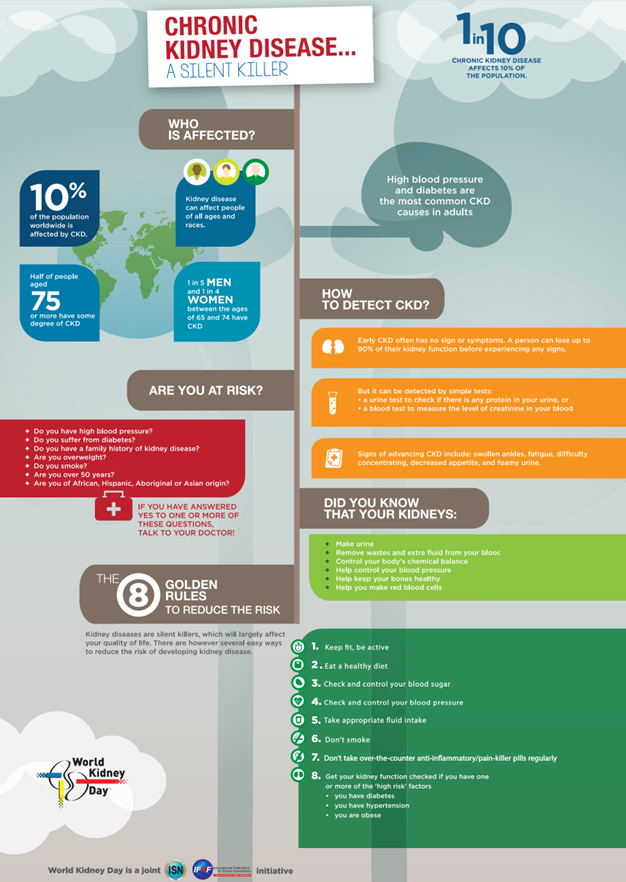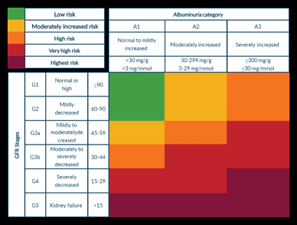Posted on: 13 March 2024
 Hello my name is Sunil
Hello my name is Sunil
I am a Consultant Nephrologist and West Yorkshire’s Kidney Health lead.
Thanks for reading this blog on why ‘kidney health for all’ is a motto for World Kidney Day, celebrated on 14 March 2024. This year's theme focuses on raising awareness of ensuring equitable access to care for people at risk of and living with kidney disease to improve their quality of life and delay the progression of the disease.
Before reading on why not carry out our quick anonymous quiz to find out what you really know about kidney health and if you’re a kidney genius. Test your knowledge at Slido.com with #4146043 or use this link. You’ll find all the answers by reading the blog.
So, what are the kidneys and what do they do?
 Most of us have two kidneys that work 24/7 filtering 160-180 litres of bloods every day and removing the toxins that our bodies produce. In addition, kidneys regulate our blood pressure, produce a hormone (erythropoietin) that helps red blood cell (RBC) production and activates the sunshine-provided vitamin D in our bodies, thus helping our muscles and bone to work properly. Kidneys are very busy vital organs.
Most of us have two kidneys that work 24/7 filtering 160-180 litres of bloods every day and removing the toxins that our bodies produce. In addition, kidneys regulate our blood pressure, produce a hormone (erythropoietin) that helps red blood cell (RBC) production and activates the sunshine-provided vitamin D in our bodies, thus helping our muscles and bone to work properly. Kidneys are very busy vital organs.
When the kidneys are not performing how they should, the person affected is in big trouble. Did you know that kidney diseases are often silent? One often doesn’t feel unwell until you have lost more than 90% of kidney function. I will now talk about common kidney conditions and how we can look after our kidneys and preserve them.
Issues with kidney health, medically called chronic kidney disease (CKD), are present in almost 10% of the population with about 4% having moderate to severe stages of kidney disease.
Kidney disease can be easily diagnosed using a blood test (called eGFR) that looks at how well the kidneys are filtering the small toxins in your blood and a urine protein test that tells you if your kidneys are ‘leaky’. Proteins are big molecules, and they should stay in your blood, not leak into your urine. If proteins are present, it means something is not right with your kidneys. Often protein in the urine is the early sign and can be missed if not checked in the patient at risk of kidney health.
 A small proportion of people living with CKD (1 in 50) end up with kidney failure, but a much higher proportion have a greatly increased cardiovascular (CVD) risk as kidney failure causes damage to our blood vessels. That means people with stage 3 kidney disease are much more likely to have heart attacks, strokes, heart failure or problems with the circulation to their feet and toes. Six serious CVD events happen every year for every 100 people with moderate to severe CKD. This risk increases as kidney disease gets worse.
A small proportion of people living with CKD (1 in 50) end up with kidney failure, but a much higher proportion have a greatly increased cardiovascular (CVD) risk as kidney failure causes damage to our blood vessels. That means people with stage 3 kidney disease are much more likely to have heart attacks, strokes, heart failure or problems with the circulation to their feet and toes. Six serious CVD events happen every year for every 100 people with moderate to severe CKD. This risk increases as kidney disease gets worse.
What causes issues with kidney health and who is at most risk?
Conditions such as diabetes, hypertension, obesity and smoking increase the risk to your kidney health. Other conditions such as genetic problems, autoimmune disease, infections, and some medicines can cause kidney damage too.
 There are large health inequalities in kidney health with people from the most deprived communities and those from ethnic minorities being at particularly high risk. 50% of people with CKD are registered with GP practices located in the top 20% most deprived places in West Yorkshire. People from Black or Asian ethnic backgrounds have a four-to-five-fold higher risk than those from white ethnic groups and kidney disease manifests 10-15 years earlier and progresses more rapidly in these people.
There are large health inequalities in kidney health with people from the most deprived communities and those from ethnic minorities being at particularly high risk. 50% of people with CKD are registered with GP practices located in the top 20% most deprived places in West Yorkshire. People from Black or Asian ethnic backgrounds have a four-to-five-fold higher risk than those from white ethnic groups and kidney disease manifests 10-15 years earlier and progresses more rapidly in these people.
Why is there an urgent need to do more for kidney Health in West Yorkshire?
In West Yorkshire, there are over 80,000 individuals with moderate to severe kidney disease (CKD stage 3-5). A third of them aren’t coded as having the condition in their health records. This means there are missed opportunities to stop disease progression. Three in 10 people only present to health services when they have advanced kidney failure. A report by Kidney Research UK suggested if things don’t change, there could be a 400% increase in demand for dialysis by 2033, healthcare expenditure on kidney care would increase to £14 billion and CKD will become the fifth common cause of premature death by 2040, predominantly through cardiovascular death.
What can be done to help the kidneys?
This year's theme on World Kidney Day 2024, focuses on raising awareness of ensuring equitable access to care for people living with kidney disease to improve their quality of life and delay progression of the disease.
There is scope to work collaboratively in the system to help kidney health. Making kidney health part of CVD risk reduction work can bring big benefits. Better management of diabetes, hypertension, obesity, and smoking can help too. Currently only half of people with diabetes and one fifth of people with hypertension get regular monitoring of their kidney health. There is also room to develop the confidence of healthcare professionals in detecting, monitoring, and managing kidney health issues; and in talking to people about the risks to kidney health and what they can do to help. Only one in 10 people with kidney disease are aware of their kidney health issues. Keep an eye out for future blogs from clinical leads to find out more about what we are doing to build kidney health management capability and confidence in West Yorkshire.
Individuals at risk of progression of kidney disease should be offered timely medications to delay progression. We have recently updated West Yorkshire’s CKD guideline. There is more work to do to ensure its implementation across our Places in an equitable manner. As a system, we are committed to reducing health inequalities, improving quality of life and life expectancy of our population, and optimising the health and wellbeing of people living with kidney disease would be key to achieving that.
I hope you look after your kidneys. Follow the eight Golden Rules – these are simple steps to ensure kidney health from the World Kidney Day website and if you are a health care professional, think about kidney health as a component of a holistic review for the people you meet.
Happy World Kidney Day 2024
Dr Sunil Daga
Contact me @sunildaga23
(Illustrations © World Kidney Day 2006-2024)
Are you a kidney health genius?
How well did you score in our kidney health quiz. Here's a recap of the answers:
1. What do your kidneys do?
a. Clears toxins from the blood
b. Maintains blood pressure and water balance
c. Strengthens bones
d. Prevents anaemia
e. All the above (correct answer)
2. How much blood volume do your kidneys clean every day?
a. 30 litres
b. 50 litres
c. 75 litres
d. 100 litres
e. 160 litres (correct answer)
3. How common is chronic kidney disease in the population?
a. 1 in 5 individuals
b. 1 in 10 individuals (correct answer)
c. 1 in 25 individuals
d. 1 in 50 individuals
e. 1 in 100 individuals
4. What are the common cause of chronic kidney disease? (tick all that apply)
a. Diabetes (correct answer)
b. Hypertension (correct answer)
c. Overweight (correct answer)
d. Smoking (correct answer)
e. Over the counter medications like Ibuprofen (correct answer)
5. How bad do your kidneys have to be before you feel poorly? (One response)
a. 25%
b. 50%
c. 70%
d. 80%
e. 90% (correct answer)
6. Chronic kidney disease is set to be the fifth commonest cause of early death by 2040. Do you know where it is currently?
a. No 20
b. No 15
c. No 12
d. No 10 (correct answer)
e. None of the above
7. Which cancers have worse survival figures than being on dialysis?
a. Colorectal cancer
b. Breast cancer
c. Lung cancer (correct answer)
d. Prostate cancer
e. None of above
8. Which test listed below is best for predicting that kidney failure will get worse?
a. Urine albumin creatinine ratio (correct answer)
b. Weight
c. Blood pressure
d. Creatinine
e. Urea
9. A heat map developed using eGFR and urine albumin creatinine ratio categories patients in traffic light colour codes – Green to Red, what risks does red zone refers to? 
a. Risk of progressive CKD and kidney failure
b. Risk of Acute Kidney Injury
c. Risk of Cardiovascular event
d. Risk of all-cause mortality (death)
e. All above (correct answer)
10. Which sort of treatment for advanced kidney failure is most likely to give the longest survival (assuming all options are possible)?
a. Peritoneal dialysis
b. Haemodialysis
c. Deceased donor kidney transplantation
d. Living donor kidney transplantation (correct answer)
e. Conservative treatment

